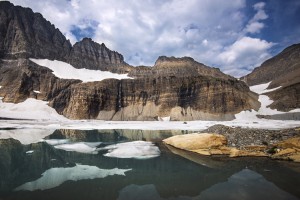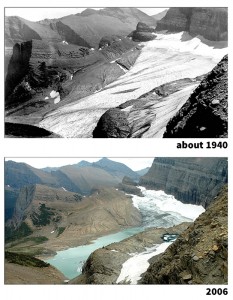Glacier Park Losing its Glaciers
Thursday, May 18th, 2017May 18, 2017
Glacier National Park in northwestern Montana may soon be without any of its trademark glaciers. Many of the park’s largest glaciers have lost much of their former size in the last 50 years, according to surveys published by the United States Geological Service (USGS) and Portland State University in Oregon. Steadily rising temperatures have dramatically reduced 37 of the park’s glaciers that are large enough to have individual names. Some have lost as much as 85 percent of their bulk.

Melt water from the Gem, Grinnell, and Salamander glaciers feeds the lakes of Grinnell Valley in Montana’s Glacier National Park. Credit: Tim Rains, National Park Service
A glacier is a large mass of ice that flows slowly under the influence of gravity. Glaciers consist of packed snow that has built up over many years. The snow’s weight eventually compresses its lower layers into ice. Glaciers scrape the ground as they move over it, eroding old landforms and creating new ones. They range in thickness from several feet or meters to 10,000 feet (3,000 meters) or more.

Click to view larger image
The retreat of a mountain glacier can provide visible evidence of global warming. These photographs show two late-summer views of Grinnell Glacier in Glacier National Park, Montana. In the photo taken around 1940, top, Upper Grinnell Lake had only begun to form at the glacier’s end. By 2006, bottom, melting ice had caused the lake to swell in size. Researchers predict that warming will melt all of the park’s glaciers by 2030. Credit: Glacier National Park Archives, top,U.S. Geological Survey, photograph by Karen Holtzer, bottom
Glacier National Park was named for the large number of glaciers found there. In 1850, the area had about 150 glaciers. Large glaciers in the park today include the Grinnell and Blackfoot glaciers. Over the past 50 years, scientists used digital maps from aerial photography and satellites to measure the glaciers in late summer when seasonal snow has melted to reveal the boundaries of the glacial ice. Surveys were conducted in 1966, 1998, 2005, and 2016. Since the first survey in 1966, the glaciers have shrunk by an average of 39 percent. Today, the park has just 26 ice masses large enough to qualify as glaciers.
Scientists blame this dramatic glacier melt on global warming, and they predict Glacier National Park will be without any glaciers at all by 2030. This is troubling news for the state of Montana, where more than 2 million tourists take in the scenic views at Glacier National Park each year. Experts worry that the glacier loss will also have serious damaging effects on the ecosystems of the park and surrounding Rocky Mountain habitats.


